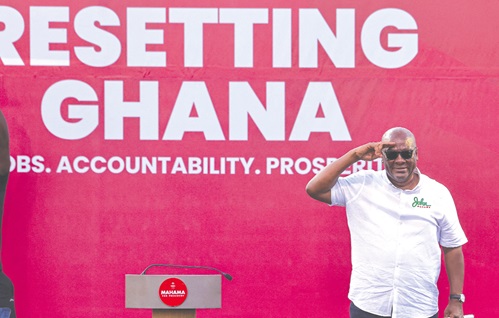Ghana is currently navigating what its government terms a “reset agenda”—an ambitious initiative aimed at restoring public confidence in governance and enhancing institutional integrity.
The rhetoric is striking and the policy initiatives are designed to attract attention: vigorous anti-corruption efforts, a review of the Constitution, streamlined ministries and strategies for macroeconomic stabilisation.
However, a closer examination reveals persistent contradictions. Is Ghana truly embracing reform or merely reshuffling the same political playbook?
Anti-corruption
At the forefront of this reset is the anti-corruption campaign, which has emerged as its hallmark.
A particularly notable incident involves an INTERPOL red notice issued for former Finance Minister, Ken Ofori-Atta, regarding claims tied to the contentious National Cathedral project and broader financial mismanagement.
While this appears to signal a new commitment to accountability, deeper scrutiny uncovers a concerning reality: Ghana's anti-corruption efforts often commence with great fanfare but soon dwindle when political convenience dictates otherwise.
Investigative bodies frequently lack the necessary resources for effective prosecution, leading to diminished public confidence.
Critics argue that corruption thrives not only due to individual misconduct but also because of systemic gaps, inadequate enforcement and political protection for allies.
Real reform demands more than selectively targeting high-profile individuals in the past administration.
It necessitates shielding anti-corruption bodies from political interference and establishing robust systems that ensure accountability, irrespective of who occupies office.
Chief Justice suspension
The suspension of Chief Justice Gertrude Torkornoo has sparked significant concerns regarding the balance of power among the three branches of Ghana’s government.
Under Article 146, the President has the authority to initiate proceedings for the removal of the Chief Justice, contingent upon the findings of a committee’s investigation.
While this practice is constitutionally sound, it raises grave questions about fairness and balance.
Why is the suspension of the Chief Justice markedly easier than the removal of the President or the Speaker of Parliament, if all three branches are meant to be co-equal and independent?
The Judiciary’s role is to act as a safeguard against executive overreach; however, the current framework allows for swift presidential action against its head.
This should be a critical point of concern for the ongoing constitutional reform discussion.
If Ghana genuinely aims to strengthen the separation of powers and protect judicial independence, it must re-evaluate how the Chief Justice and senior judges are disciplined or removed, lest the Judiciary fall prey to political whims.
Constitution review
The Constitutional Review Committee, led by Professor Henry Prempeh, arrives at a crucial moment.
This committee is tasked with addressing various longstanding issues, including excessive executive powers, the functionality of the Council of State, the marginalisation of local governance structures among others.
Since its inception in 1992, Ghana’s Constitution has been critiqued for excessively concentrating power within the presidency.
The President appoints nearly all key public officials, creating a risk of political capture for independent institutions.
As public consultations unfold, the pressing question remains: will this review instigate structural reforms that limit presidential overreach or will it merely result in superficial alterations?
Meaningful reform must encompass legally enforceable limits on presidential appointments, a reassessment of the Council of State’s role, and enhanced mechanisms for public accountability.
Ministerial trimming
Moreover, the reduction of the executive branch has been championed as a key pillar of the reset agenda. In early 2025, President Mahama trimmed the number of ministries from 30 to 23, merging several portfolios in a bid to enhance operational efficiency.
On the surface, this initiative appears promising—suggesting a leaner, less bureaucratic government. However, critics argue that renaming or combining ministries, in itself, does not equate to meaningful reform.
For such structural changes to yield real impact, they must be underpinned by a culture of results-oriented leadership, transparent budgeting, and rigorous performance evaluation.
Without these, what is presented as reform risks being little more than cosmetic rebranding.
Perhaps, it is time to look beyond the organisational charts and examine how these changes are affecting the ministries’ performance on the ground
Economic recovery
Amidst these political manoeuvres, Ghana’s economic recovery, while showing encouraging numerical trends, remains painfully slow for ordinary citizens.
Inflation dropped to 18.4 per cent in May 2025, down from 23.1 per cent in January 2025, with the Bank of Ghana projecting further declines by year’s end.
However, these macroeconomic successes are of little consolation to families struggling to afford basic necessities, transport, housing and medical care.
Unemployment levels remain alarmingly high, particularly among the youth and utility costs continue to rise.
This escalating cost-of-living crisis has significantly eroded public trust in government initiatives.
To genuinely alleviate this burden, the government must pursue a multifaceted strategy that includes targeted subsidies for essential goods, public works programmes aimed at job creation, investment in agricultural supply chains to reduce food prices, and an expansion of social protections for vulnerable populations.
Fiscal prudence must be balanced with a sense of compassion.
Public expectation
Ultimately, Ghana’s reset agenda emerges at a critical juncture, with faith in democratic governance teetering on a precipice.
The public’s expectations hinge not only on promises and policies but also on the sincerity of commitment to genuine reform and accountability.
The path ahead will demand courage, vision and an unwavering dedication to the principles of integrity and transparency.
Only then can Ghana achieve a true reset of its governance landscape, one that serves its citizens and addresses the pressing challenges they face.
The writer is a political scientist

